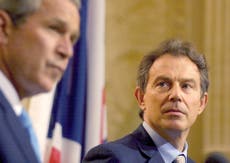These are Britain’s past misjudgments in the Middle East - and how we’ve failed to learn from them
There was confusion and muddle and serious miscalculations. Most of the big mistakes were made by politicians in London who got bees in their bonnet about the Middle East, ignored or excluded the experts, and, perhaps their most besetting sin, failed to think policy through

In April 1916, in one of the worst humiliations suffered by the British army, some 13,000 British and Indian troops surrendered at Kut-al-Amarah in Mesopotamia (today’s Iraq.) The subsequent enquiry forced the resignation of the Secretary of State for India, Austen Chamberlain. The commander-in-chief of the Indian army, Sir Beauchamp Duff, committed suicide.
Subsequent official enquires examined the causes of unrest in Palestine in the interwar years. There was an in-house Foreign Office report on the events leading up to the 1979 Iranian revolution. The Scott enquiry looked into reports of arms sales to Iraq during the Iran-Iraq war of the 1980s. And now come the twelve volumes of the Chilcot report.
British policy in the Middle East since the First World War has been peculiarly accident prone.
Britain made conflicting promises to the Arabs, Zionists and French during the First World War, and was responsible for the creation of what have proved two of the most catastrophic states in the region – Palestine and Iraq. Then in 1956 came the Suez debacle, when Britain tried to re-invade Egypt, and was forced ignominiously to withdraw by the Americans. In the early 1960s, Britain tried to establish a South Arabian Federation to maintain its base in Aden. The Federation collapsed in 1967, when, under pressure from a local insurgency, Britain withdrew from the territory. Despite the 2003 Iraq war, there was no political follow-up to the 2011 intervention in Libya, which opened the way for civil war and ISIS.
Given the importance and political complexity of the region, Middle East policy needed to be crafted with particular care, with a significant input from regional experts, including the Foreign Office’s corps of Arabists who knew the tribes and people and understood the local situation. Caution was made more important because British power was on the decline. As one official warned in 1920, “The Empire has reached its maximum and begun the descent. There is no more expansion in us … and that being so we make but a poor best of the Arab countries.”
But that’s not what happened. Instead, there was confusion and muddle and serious miscalculations. Most of the big mistakes were made by politicians in London who got bees in their bonnet about the Middle East, ignored or excluded the experts, and, perhaps their most besetting sin, failed to think policy through.
When considering the Balfour declaration in 1917, the War Cabinet were warned by Lord Curzon that the local Arab population “will not be content to be expropriated for Jewish immigration or to act merely as hewers of wood or drawers of water to the latter.” But the War Cabinet then failed to realise that both promising the Jewish a homeland and swearing respect for the “civil and religious rights” of the existing population was a guaranteed recipe for trouble.
In 1956 an experienced British government, under a distinguished former Foreign Secretary, Sir Antony Eden, allowed itself to be panicked into an ill-conceived military operation. Overestimating the threat posed by President Nasser, they proceeded to overlook the practical difficulties of removing him. They ignored American warnings against military action, failed to establish a proper exit strategy, and did not appreciate that the cover plan of intervening to separate Egyptian and Israeli forces, with whom they were in collusion, was wafer thin. Those likely to object, including the lawyers and diplomats, were excluded from the planning.
In the early 2000s, the Iraq file should have come marked with large red stickers, labelled “Fragile State. Handle with Care.” But so concerned was Tony Blair after 9/11 about the spread of WMD that he pushed through a military operation without a proper assessment of the seriousness of this threat, and without understanding its likely repercussions in Iraq.
There is no shortage of lessons to be drawn from British failures in the Middle East. The problem has always been in actually learning them.
Peter Mangold is the author of "What the British Did: Two Centuries in the Middle East".


Join our commenting forum
Join thought-provoking conversations, follow other Independent readers and see their replies